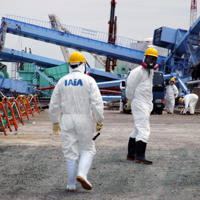As the International Atomic Energy Agency held its Board of Governors meeting and annual General Conference over the past two weeks, the members of this often-overlooked United Nations body found themselves thrust again into the public limelight and burdened with a rapidly expanding agenda. Governments jousted over how to craft new approaches to deal with the aftermath of the nuclear accident at Fukushima, divvy up the agency's budget and deal with controversial nuclear programs in the Middle East. The debates took place among a membership bitterly divided between those states with advanced nuclear capabilities and those that lack them, divisions that are likely to persist even after the agency turns the page on this year's meetings.
Charged with navigating this terrain is Director General Yukiya Amano, a veteran Japanese diplomat who took the helm of the agency two years ago. Compared to his more outspoken predecessor -- Mohamed ElBaradei, who is now running for president of Egypt -- Amano has struck a low profile while taking care to establish close ties with leading nuclear powers including the United States and the European Union. They have applauded him, for example, for being more willing to use blunt language and take more forceful actions in challenging Iran and Syria for their failure to comply with IAEA and U.N. Security Council directives. However, Amano has also been criticized by some IAEA insiders for refusing to use certain tools in the IAEA toolbox, while many member states have faulted the IAEA's hesitant response to Fukushima as well as Amano's unwillingness to push his native country's government to be more transparent about the disaster. On top of these challenges, the agency's budget has barely grown over the past three decades, while its mission has mushroomed, leaving few IAEA members satisfied with the share of the IAEA budget that is allocated to their priorities.
How Amano and the agency handle these tasks is of no small importance. The U.N. "atomic agency" must respond to a broad spectrum of challenges, and worst-case scenarios appear treacherous. Clumsy maneuvers in dealing with cases of noncompliance could hasten a nuclear arms race or military conflict in the Middle East. Failure to address concerns about nuclear security would put the agency at odds with its largest donor, the United States. The IAEA also plays a significant role in assisting states to develop an appropriate regulatory infrastructure and technical knowledge for their planned or existing nuclear energy programs, a particularly crucial area given post-Fukushima shifts in public perceptions about nuclear energy's risks. As Amano begins the third year of his tenure, the agency's ongoing evolution rests in large measure on his ability to skillfully balance member states' conflicting priorities in a difficult financial and diplomatic environment.

